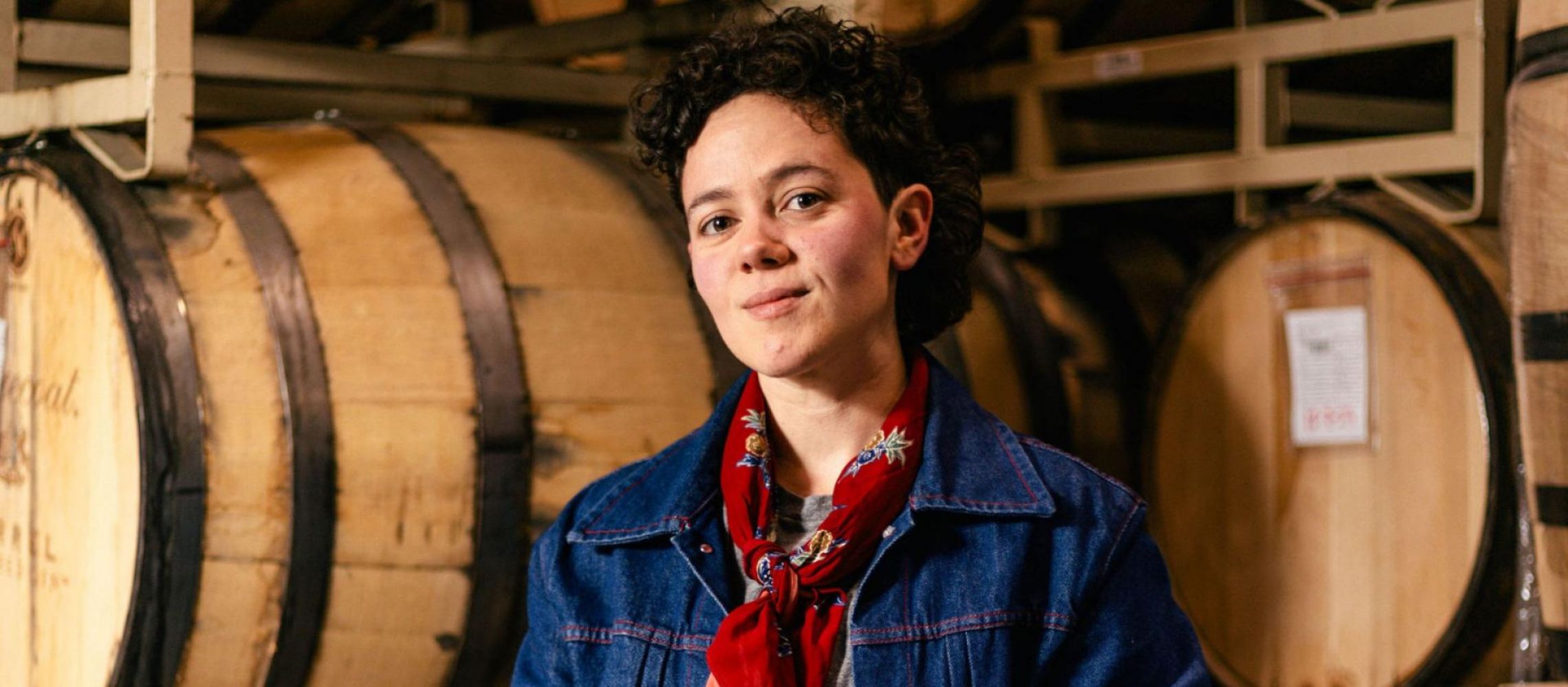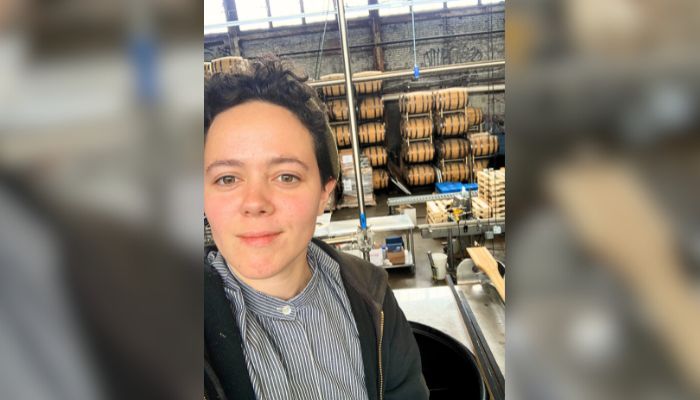Submission Deadline
28 February 2026
Judging
Date
24 & 25 March 2026
Winners Announcement
22 April 2026
28 February 2026
24 & 25 March 2026
22 April 2026

Meet Theo Loftis, a distiller whose journey from art and literature to producing spirits is equally interesting as the delicate tastes they expertly blend. Theo's decision to enter the distilling industry was driven by a desire for change and a deep respect for sensory discovery. After leaving their position organizing arts programming and exhibitions, they began an exciting new adventure, drawn to the complexities of distillation by their great passion for spirits, fermentation, and botanicals.
When Theo first stepped into distilling, they were thrilled by the warm reaction they received from Philadelphia Distilling. Starting as an apprentice and later progressing to a full-time role, they relished the hands-on aspect of their work, embracing every opportunity to dig further into their passion for crafting unique and flavorful spirits.
Beyond what they love to do, Theo is a strong advocate for diversity in the spirits sector, understanding the critical role of cooperation and inclusivity in fostering creativity and development. They are a strong believer in the power of knowledge sharing and breaking down barriers to create a more inclusive and equal industry landscape for everyone. To learn more about Theo's interesting journey into the subject of distillation and acquire key market insights, check out the whole interview below.
I am an artist and a writer, and my first career was oriented around facilitating arts programming and exhibitions. I decided I needed a change a few years ago, and was inspired to see how I might dip my toe into distilling. I had a feeling I would like it because I love spirits, fermentation, and plants. I already had a practice of making tinctures and Amari at home, which was something I had always fantasized about getting deeper into. When I went and talked to someone at Philadelphia Distilling, they were surprisingly encouraging. Recently, I was reminded by my boss that I was pretty persistent with follow-up after that moment! Eventually, I caught him at a time when it made sense for the production team to take on an apprentice. So I worked in that way for a while and then started full-time last summer. All in all, it’s been a wonderful experience.
The place where I work is structured so that everyone on the distilling team takes on a variety of tasks, and days can look different. On days that we’re distilling on one of the larger stills, I usually come in early to get it going. That’s hands-on and nonstop for several hours.
I appreciate when I can allocate some time for recipe development, which I love. Every few weeks I’m working on a product like our amaro, Vigo, that involves large-scale infusion– that can eat up a bunch of hours in a day. Then there’s general upkeep stuff and aging. To monitor progression, I take samples from barrels regularly and gather the team to evaluate them for potential blends.
At one point before making this career change, I noticed a trend in my projects leaning toward work that placed a lot of value on sensorial expression and experience. I was (and still am) interested in thinking about food and fragrance in Art with a capital “A.” So I think I was kind of predisposed to considering how I might incorporate gustatory – olfactory experimentation into creative work.
Honestly, though, it was a calculated guess. I knew I wanted to find a line of work that was hands-on and creative, but also would allow me to save some creative juice for my own time. And again, this work seemed to line up with some personal hobbies in a nice way. When I started, I had no concept of what it would be like to work on a production floor. Like none at all, I hadn’t even considered that very large aspect of what we do, which is kind of funny.
I think it’s important to have a story or framework for a new spirit, and that should come primarily from the person or group that is creating the recipe. It’s just so compelling when you can taste what’s communicated in a narrative. I try to write down a vision for the “atmosphere” of stuff I’m developing. For me, language is an incredibly helpful tool for setting intention, and a speculative description can help create guideposts for the often very windy road that is R&D.
A good distiller can create an inspiring spirit that helps you engage with your senses in a new way. A good distiller doesn’t just know the procedures, they know the “why” behind them.

Image: Gab Bonghi
That’s a personal question! It depends on the said distiller’s strengths and interests. I’m a very curious person, so I crave variety and learning opportunities in my work. Distilling can fulfill that need – there are so many captivating aspects of it. But there are of course days where I’m hyper-aware of the fact that this place is, in essence, a factory. Those days are the hardest for me. But luckily it’s pretty easy to find something to capture your fascination again.
The lack of diversity within the industry is a problem. It becomes evident, from my perspective, in competitive and traditionalist mindsets. Like a lot of folks keep their cards to their chests and hold “industry secrets” super tightly. While healthy competition can drive excellence, it can also stifle collaboration and innovation. On the other hand, it’s so refreshing when people share their strategies and techniques. I hope that becomes more standard. There’s also an obsession with originality that stems from competitive and commercialist perspectives, which I think hinders healthy progression (and fosters this tendency towards gimmicky releases that we see all the time). On a less macro-level, competitiveness can deliver a kind of “macho” energy – one that disregards people’s needs and abilities that differ from the norm. There’s a reluctance to embrace new ideas from different perspectives and a more balanced leadership makeup would help change that. Luckily there are a lot of people working on this issue, and I feel grateful that my job environment is supportive of me, especially as someone with identities that don't match the stereotype.
There’s a lot of science stuff I could mention that I’m learning about, but honestly, what has been giving me the most life lately is returning to facilitation techniques and theory. Collaboration is really important to me and I think having the skillset to make minds work together better is vital.
[[relatedPurchasesItems-63]]
Mm. In the dream, there’s time for art: making it, thinking with it. In the dream, you’re putting stuff out there and learning from what people say in response to it. You are nourished by your surroundings, your relationships, and yourself. You often experience awe.
When I’m out, I always try to sit at the bar. Usually, if I’m at a cocktail spot, I ask for the weirdest thing they’ve got. Or I convince someone to make me an experiment. Variety is my go-to, I guess! I love learning from bartenders.
WSET’s distilling textbooks were super helpful for me when I was getting started. It’s really fun to look at 19th-century distilling books that have recipes and drawings in them – if you google “practical distiller” you can find a bunch. And this is not about spirits per se, but honestly, I think everyone needs to read MFK Fisher.
I spend a lot of time with our barrels. We don’t have a rick house, we just work around them all the time, which makes it easy to look in on them. Most weeks I’m climbing up the racks with a drill and a few flasks to prepare samples that our team can evaluate. For our barrel-finished gin, we use a specific ratio of gin aged in new white oak barrels and gin aged in white oak barrels that have been used once before. The second time we use the barrel, we usually get different flavor compounds– less furfural and vanillin for example– and end up with something that is more ginny and less “rich” or “deep”. To make a blend I first take a look at how the team has responded to specific barrels, and then I pick a few combinations that I think might help us achieve something true to the product. Then our five-person distilling team rates each of those mockups (usually six at a time) and we adjust from there. It’s paramount that we all feel good about whatever we’re putting out into the world.
I’m grateful for this question. We like to work with folks to recycle our botanical waste – like a soap maker will take a few buckets from time to time, a brewery will use some spent amaro botanicals in a new brew, that kind of thing. But it’s far from the majority – we do add a lot of organic waste to the dumpster. It would be awesome to compost it, but the logistics are a bit of a headache, so it’s hard to find a composting partner.
Something I take quiet pleasure in is perfecting the choreography of taking out the recycling to the bin. We recycle so much cardboard every week. It’s wild to me-- I’m a total scavenger and I do sometimes steal discards to make stuff with at home.
In my hazy understanding of the sales landscape, aperitifs, and vermouths are on the up and up. Which is great for me, because I love both of those categories! Something I’d love to see is a product that explicitly pays homage to the medicinal ancestry of this kind of spirit. Maybe the spiritual ties also.
Show your spirits where it matters. Get your products tasted by top bartenders, buyers and experts at the London Competitions — enter now.